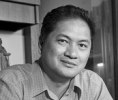Democracy and sustainability
- Details
- Blog Content
- Hits: 7254
Democracy and sustainability are words often heard and bandied about these days, as we all strive for both economic and social development. Sustainability as an issue is often associated with environmental concerns, while democracy is associated with politics and government. The link between the two, however, is rarely—if ever— taken into consideration.
Interestingly, just last Wednesday a London-based non-governmental organization, the Foundation for Democracy and Sustainable Development (FDSD) launched a Manifesto for Democracy and Sustainability—the first of its kind. This Manifesto is the result of an international process that draws on more than three hundred consultation responses from people in over thirty-five countries worldwide. Among many others, I am an original signatory to the manifesto as well as the Ateneo School of Government where I am Dean.
According to John Lotherington, Chair of the Foundation for Democracy and Sustainable Development, “[d]emocracy and sustainability are the two vital elements of what we will pass on to future generations, but their crucial interdependence has been neglected. This Manifesto sets out to change that and to inspire creative action worldwide. Putting the Manifesto together was itself an example of such action, with hundreds of people participating, from diverse backgrounds and from every region of the world.”
With the support of a diverse group of founder signatories, a few of whom—including myself—are from the Philippines, the Manifesto was launched online and serves as the heart of a larger Democracy and Sustainability Platform. The platform is an online space for members or signatories to share ideas and actions on how democracy as a system of principles and actions can be utilized to achieve true sustainability.
The Manifesto itself comprises six principles that are meant to serve as a guide for a global movement for change, from “sustainability needs flourishing democracy” to “nothing about us without us.” Each principle has an explanation and a set of examples that would allow members to see it through. These principles focus on areas where proponents feel that democracy, as a political system, urgently needs to change in order to promote equity and environmental health for present and future generations.
Members of the Democracy and Sustainability Platform—individuals, organizations, alliances and networks—have chosen to associate themselves with the goals and principles embodied in the Manifesto. While they do not need to agree or ascribe to each and every principle, they are encouraged to share, through the Platform, at least one example of their efforts to implement the Manifesto every year.
Through the Manifesto, democracy and sustainability are put forward in a manner more accessible to the public. Democracy under the Manifesto is described as “the rule of the people, by the people and for the people,” and cautions the public against “decision-making that is democratic in name only.”
Sustainability, on the other hand, is described in the Manifesto as “meeting the needs of the people without compromising the ability of future generations to meet their own needs.” As human activities continuously exceed the earth’s natural limits, future generations are deprived of resources that could be necessary for their survival.
Proponents of the Manifesto feel that democracy as it now stands is not ready to face major environmental and social threats that need to be immediately addressed, such as climate change, population shifts, natural resource scarcity and the rapid extinction of species. These issues place extreme and unavoidable pressures on democracy, both as a precept and as a system of government—in a way making it greatly inadvisable to view democracy separate from sustainability.
Democracy is something we, as a Filipino people, are intimately familiar with, given our nation’s history. Our freedom is something we hold dear, and guard almost jealously. Our human rights are valuable to us, because we have gone through a time when we were deprived of access to them.
Sustainability, on the other hand, could be considered as rather new to us, in the way it is presented. As an issue, words used to describe it have a tendency to complicate one’s understanding of the ideal behind it, making seeing it through perhaps slightly more difficult than it ought to be.
As Filipinos, however, we have more than a passing familiarity with respect—it is a value we put a premium on, and is something we feel should be as natural to us as breathing. Working towards sustainability and linking it with democracy is, therefore, essentially a way through which respect is manifested. Sustainability is an awareness of the needs of future generations, and respecting their right to live free from being deprived of what they will need for not just survival, but fulfillment as well.
Our fight for democracy was done not just for ourselves, but for our children, and our children’s children, as well. It seems we accomplished that. Now, as we work towards sustainability, we are fighting for a future where our children’s children, and further on, will be able to live lives where they will not only be free, but fulfilled as well.
 Eagle Eyes is Dean Tony La Viña's column in Manila Standard Today. Follow him on Facebook: This email address is being protected from spambots. You need JavaScript enabled to view it. . Twitter: @tonylavs.
Eagle Eyes is Dean Tony La Viña's column in Manila Standard Today. Follow him on Facebook: This email address is being protected from spambots. You need JavaScript enabled to view it. . Twitter: @tonylavs.

